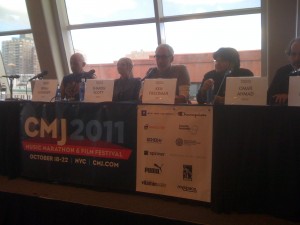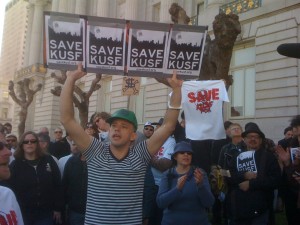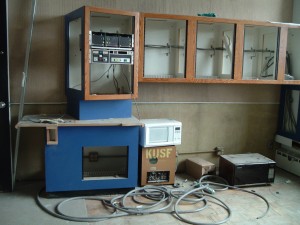In the past year, a number of high profile college radio stations have been moved off FM. Many claim that we are in the midst of a crisis, in which university officials are contemplating selling or leasing their valuable FM airwaves in exchange for monetary compensation. In order to address this trend, CMJ assembled a panel on October 20, during College Day at this year’s CMJ Music Marathon.
“Saving College Radio” featured representatives from WFMU, WSOU, Kusf-in-Exile, WRVU Friends & Family, and the Intercollegiate Broadcasting System (IBS) speaking about both the fight for college radio and about ways that stations can protect themselves. Although the audience of college radio DJs expressed little fear about their own stations’ futures (a show of hands indicated that few believed that their stations might be sold), the panelists argued that no one should take their station’s license for granted.
Ken Freedman, Station Manager of WFMU, moderated the discussion and started things off by saying, “We’re living in a completely new era…dozens of stations [are] being sold.” He explained that, “the value of college radio has only recently been discovered” and added that this is coinciding with the fact that many universities are “desperate” for cash. Freedman added that in most cases, stations are being sold to “NPR conglomerates” and that the resulting programming replaces “unique” local stations with a “robot repeater.”
Irwin Swirnoff, a former Music Director at KUSF told the story of how the University of San Francisco radio station was taken off the air on January 18, 2011. He explained that ever since January 18, he has been “fighting to save KUSF.”
Similarly, Sharon Scott, former General Manager of Vanderbilt University station WRVU, described how she is in the midst of fighting the pending sale of the station. She explained that back in September, 2011, the Vanderbilt community was told that the owners of the WRVU license were considering a sale of the license. By June 6, 2011, a tip from a CMJ writer alerted WRVU staffers that the call letters for the station had been changed and by the next day, students were ushered out of the station. Now WRVU is playing “purely classical music” through a lease agreement with Nashville Public Radio.
In addition to Swirnoff and Scott, the panel also included some college radio folks who are not in the midst of fights over licenses. Omar Ahmad, Station Manager of WSOU, said that his station is “doing really well” and even added that they’ve had “assurances” from their university President about the future of the station. Norm Prusslin of IBS added, “College radio has fought the good fight for 70 years.”
Keep Your Licensee Happy & Make Friends with Station Alumni
Freedman then explained that it’s really important to maintain a strong relationship with one’s home institution, saying, “keep it a happy licensee.” Ahmad said that WSOU tries to do a lot for Seton Hall University. They broadcast many university events, including basketball games and other live remotes on campus. The station even sets up big promotions at these events, handing out stickers and WSOU merchandise so that they can further spread the word. He added, “You just have to make the licensee feel that they’re getting some kind of value.” Prusslin agreed, arguing that it’s important to understand who owns your license and it’s imperative to work at “building relationships at your home campus” and “think of ways to engage your alumni.”
Ahmad also pointed out the importance of forging ties with station alumni. He suggested having alumni return to the airwaves as guest DJs and also recommending reaching out to them in times of trouble. He added, “Don’t ever ignore a request from an alumni.” Later in the discussion he said, “You have no idea how powerful they are” and “they will be there to fight for you.”
Signs that Your Station Might be in Danger
Freedman said that “every time a station has changed hands…in retrospect…the writing was on the wall.” He pointed out a few warning signs, including inventory requests, stations being moved to new departments, and funding changes. He explained that WFMU was formerly a college radio station owned by Upsala College. Freedman started to get worried about the station’s future after the college kept trying to get them to pay for more and more of their expenses. He also was getting told that the school was getting offers to purchase the license from religious broadcasters. When it seemed that they could lose their license, Freedman worked to form a non-profit so that he could eventually make an offer on the station.
Could a University President Guest DJ Stint Have Helped?
With that in mind, Freedman asked the panel to speculate on what could have been done to prevent KUSF and WRVU from being put on the chopping block. Swirnoff said that at KUSF, they always felt like the “unwanted step child” stashed away “in a basement.” He explained that administrators “never stepped into the station.” He said that in retrospect, it would have been helpful to have engaged more with the university. He said that it would have been great to have the university president do a “guest DJ set every year.” Swirnoff also said that it would have been helpful if KUSF had worked to collect testimonials from alumni, students, and bands over the years. He added, “Radio is so so important and super special” and that stations should “take a lot of pride in that.” He explained that KUSF has been working with some “very supportive faculty,” but that it’s important to forge those relationships before a station is in crisis.
Staying off the University’s Radar May Not be the Best Strategy Anymore
Scott argued that there is a real crisis in college radio and pointed out that WRVU is in the midst of a deal to sell the station for $3.35 million. As she addressed the audience, she said, “you guys are sitting on a lot of money.” As far as the situation at Vanderbilt, she described WRVU as the “freaks fraternity” on a “very conservative” campus. She said that over the years the station wanted to stay off of the school’s “radar.” Yet, in recent years some changes at the station started to occur under the leadership of a new advisor, who Scott characterized as the “grim reaper of college radio.” According to Scott, that advisor brought in “more and more staff,” meaning that students became less involved with certain aspects of station management. News and academic programs at the station were cut, meaning that the “public benefit” of the station was reduced. Scott agreed that, “anything you can do to engage yourself with the university is good.” To that end, WRVU supporters have worked with tenured faculty allies and have also worked to obtain letters and testimonials.
Prusslin said that not only is it important to forge ties with university administrators, but that one’s relationship with student government can also be critical, especially if they are a “direct funder of the radio station.
Play Less Gory Metal
Ahmad explained that although he believes that WSOU is in a good place with its administration, there have been times when the station has been under fire. It’s a heavy metal station at a conservative Catholic university, so there have been mandates from the school regarding musical content. With that in mind, the station now plays “modern active rock” (a more palatable term for metal) and does not play anything that “goes against the church,” “is misogynistic” or “gory.”
Make Students a Priority
KUSF, also at a Catholic university, began as a student-run station. Swirnoff pointed out that over the years more and more community volunteers became involved with the station. He said that it was “beautiful” to see students and non-students working together and added that it spoke to the mission of University of San Francisco. Despite that, the station was taken off the air while students were on winter break. He explained that it was a “secret deal” and was carried out “like a corporate take-over of a non-commercial station.” He said that thinking back on things, there were “internal issues that came back to haunt us” and argued that making students a “priority” might have helped.
Set up a Non-Profit
Some of the practical tips that came out of the panel included Freedman’s suggestion that all college radio stations should set up a non-profit “friends of” organization. He said this should be done with the permission of the college and that the group can be used for alumni outreach. The non-profit can also be a potential buyer of the station’s license if the university ever decides to put the station up for sale.
Learn about the Players: Brokers, Public Radio Capital, etc.
Prusslin also suggested that people involved with college radio learn more out the broader “landscape of non-commercial radio,” including the world of brokers. He recommended doing outreach to music associations and in one’s every day dealings to be “responsible” and “collaborative.”
Scott added that it’s good for stations to get letters from prominent alumni and align with a department on campus. She also encouraged everyone to learn more about Public Radio Capital’s role in station sales and the trend of public radio stations seeking out multiple radio outlets in their communities for talk and classical programming. She also said that in the case of WRVU, “the university really intimidated the students” with threats of “honor code violations.” Scott also argued that “bad surveys” gave the wrong impression of the station, when in fact it was the largest student organization behind the Greek system. She suggested that students at stations add a historian position (as WRVU did) and that they also become more involved with the station’s FCC filings. Supporters of WRVU also established the non-profit WRVU Friends and Family. Scott pointed out that groups like Volunteer Lawyers for the Arts can help stations set up a non-profit.
Occupy the Airwaves and Write the FCC
Swirnoff reiterated that there is a “crisis right now” and an increasing “commercialization of the left side of the dial.” He argued that the “airwaves belong to us” and encouraged everyone to “spread the word” about recent station sales and to “write the FCC” expressing concern. He added, “we have to occupy” the non-commercial airwaves. Freedman added that the situation at KUSF has become an “unprecedented FCC case” and that this is helpful to other stations in danger.
***
Here are are a few more resources for stations looking to ensure their future:
9 Tips to Ensure College Radio’s Survival
Saving College Stations Panel at June 2011 NFCB conference
College Radio DJs from California Convene at KCSB for UCRN Conference
Saving College Radio Panel at SXSW 2011 (Podcast)
The Mediageek’s Advice for College Stations, Part 1-Be True to Your School
The Mediageek’s Advice for College Stations, Part 2- No More Elitism, Recruit, Recruit, Recruit
Previous posts on CMJ 2011 include:
College Radio in the Spotlight
College Radio Still in the Spotlight at CMJ Music Marathon: Music Directors Talk Shop
CMJ College Radio Awards Winners Announced
CMJ Announces Nominees for 2011 College Radio Awards
Nominations Open for 2011 CMJ College Radio Awards





